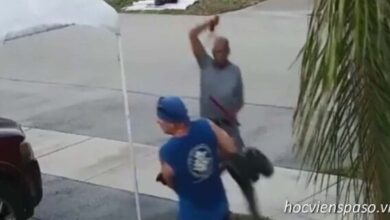Manny Ellis Video: Verdict and Controversy Surrounding the Passing of Manny Ellis

In 2020, Manny Ellis Video became an integral part of a controversial and controversial case in Tacoma, Washington. This video captures a series of shocking events and has sparked a national debate about justice and fairness in cases involving the deaths of people of color when interacting with police. Let’s go deeper into this story with hocvienspaso.vn.
This video captures the tense incident between Manny Ellis and three police officers. In it, Ellis was restrained and used a taser gun before passing away, a sad image and full of opposition from public opinion. At this heartbreaking encounter, the words “Can’t breathe, sir” became a symbol of the feeling of helplessness in the situation, as well as raising many questions about the actions of the police and the use excessive force.
Manny Ellis Video is not only a key piece of evidence in the case, but also an inspiration for the debate on police reform, racism and the need for accountability from the justice system . With a closer look at the video’s content and its implications, we can gain a deeper understanding of the significance of the Manny Ellis Video in the debate about social justice and equity in America.
I. Event summary:
At the Manny Ellis Video trial, the jury found three police officers innocent in the death of Manuel “Manny” Ellis in Tacoma, Washington in 2020. Christopher Burbank and Matthew Collins were found not guilty of the murder. charges of assassination and murder, while Timothy Rankine was also found not guilty of murder charges. The end of this trial caused a lot of controversy and raised big questions about justice and fairness in cases involving the death of people of color in contact with the police. This is one of the most important and controversial cases in the fight for police reform and judicial accountability in the United States.

II. Reactions from Participants and the Community:
The outcome of the Manny Ellis Video case triggered a range of emotional responses from various parties, as well as the local community:
– Heartbreaking Reactions: Manny Ellis’s family and members of the local community expressed profound sadness and disappointment upon hearing the trial’s verdict. The trial’s conclusion left them deeply disheartened and in pain, as they had hoped for a different outcome.
– Protests and Demonstrations: In the wake of the trial’s verdict, a significant protest emerged, echoing the slogan “No justice, no peace.” Demonstrators took to the streets to voice their dissent, highlighting their determination to seek justice and accountability in the face of what they perceived as an unjust decision.
These reactions from participants and the community underscore the emotional toll and the wider implications of the Manny Ellis case, which has sparked intense discussions about the pursuit of justice, police accountability, and broader issues of racial inequality and police brutality.
III. Similarities with the George Floyd case:
The Manny Ellis case exhibits notable similarities to the tragic events surrounding the George Floyd case, creating striking similarities that cannot be ignored:
– Defense argument: In both the Manny Ellis and George Floyd cases, the defense presented a story based on alleged drug use and the victims’ underlying heart disease. This argument is intended to create controversy and raise doubts about the circumstances leading to their deaths.
– Judgment results: The verdicts in both cases closely mirror each other and are consistent with the defense’s arguments. The acquittal of the officers in the Manny Ellis case, as in the George Floyd case, has caused significant controversy and has increased the ongoing debate surrounding the legitimacy of these arguments and the pursuit of Justice.
Echoes of the George Floyd case in the Manny Ellis trial highlight the persistent challenges the criminal justice system faces when dealing with cases of alleged police misconduct, bias race and excessive use of force. These similarities further highlight the need for efforts to comprehensively reform the police sector and seek greater accountability in policing.

IV. Questions Surrounding Justice and the Judicial System:
The conclusion of the Manny Ellis case has generated a myriad of critical questions and concerns regarding justice, police funding, and the effectiveness of the judicial system in the United States:
– Justice and Accountability: The acquittal of the officers involved in Manny Ellis’s death raises serious doubts about the accountability of law enforcement officers when facing allegations of misconduct. It has prompted discussions about whether the judicial system can effectively hold officers responsible for their actions, especially in cases involving individuals from marginalized communities.
– Police Funding and Reform: The case has intensified debates about police funding and the urgent need for comprehensive reform within law enforcement agencies. Many are questioning the allocation of resources and the necessity for reevaluating police training, protocols, and policies to address systemic issues.

– Judicial System’s Impartiality: The outcome of the trial has cast a spotlight on the perceived impartiality and fairness of the judicial system, especially in cases where racial disparities in policing are evident. Questions have arisen about whether the system provides equitable treatment and access to justice for all citizens, regardless of their background.
– Calls for Reform: The Manny Ellis case has reignited calls for broader reform efforts aimed at addressing systemic issues within the prosecutorial and judicial systems. The pursuit of justice and fairness in the legal process has become a central theme in discussions about reforming the criminal justice system.
In conclusion, the Manny Ellis case serves as a stark reminder of the complex challenges facing the United States in its quest for a more equitable and just society. It prompts critical reflections on the pursuit of justice, the role of law enforcement, and the need for comprehensive reform efforts to ensure that the judicial system serves the interests of all citizens.








